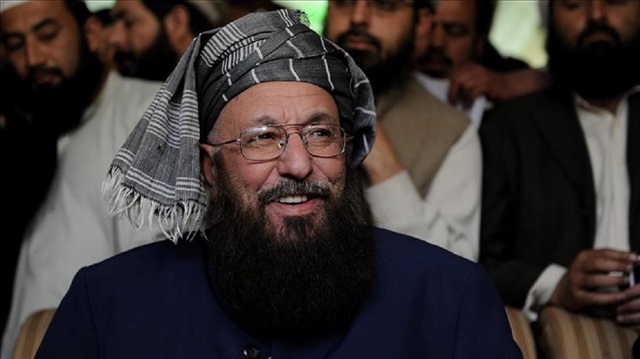
Afghan delegation asks Maulana Sami-ul-Haq and Siraj ul Haq to help bring Taliban to the negotiating table
Pakistan's key religious leaders have assured an Afghan government-sponsored peace council that they will do their part to help end Afghanistan’s decades-long conflict.
"We assured the Afghan delegation that we are ready to play a role in bringing peace to Afghanistan," Maulana Sami-ul-Haq, head of Jamiat Ulema-e-Islam, told Anadolu Agency by phone Thursday.
A seven-member delegation of the Afghan High Peace Council headed by Maulvi Attaullah Lodin met with Maulana Sami-ul-Haq in Islamabad and sought his help in restoring peace to the country.
Haq suggested that the Afghan delegation sit with the Taliban and pave the way for removing mistrust and holding direct peace talks. But the Afghan delegation asked Haq to play a role and convince the Taliban to hold direct talks with the Afghan government.
Haq is also head of “Darul Uloom Haqqania”, a religious seminary in the town of Akora Khattak in northwestern Khyber Pakhtunkhwa province, and is believed to have influence on the Afghan Taliban as many of their key leaders have studied there.
"I offered my madrassa Haqqania [as a venue] so the Afghan peace council delegation could sit down with the Taliban for face-to-face talks," said Haq, adding he will extend the same offer to the Taliban.
The Afghan delegation also met with Siraj ul Haq, the head of the country's mainstream religious-political party Jamaat-e-Islami (JI), and sought his support in restoring peace in Afghanistan.
"We believe that peace in Afghanistan is essential for the peace of the whole region and we always stand with our Afghan brothers and support the sovereignty, stability, peace and progress of Afghanistan," Siraj ul Haq told Anadolu Agency.
He urged all Afghan groups to work together to bring peace to their country and compel foreign forces to leave.
Taliban spokesman Zabihullah Mujahid declined to comment on the Afghan peace council delegation’s meetings with Pakistani religious leaders.
However, in a statement issued on Sept. 29, Mujahid asked Afghan and Pakistani religious scholars to refrain from participating in conferences on the war in Afghanistan in Islamabad and Kabul.
"We call on all sincere scholars to boycott these conferences and not become victims of American strategies and intelligence plots," he said in the statement.
On Sept. 15, during Pakistani Foreign Minister Shah Mehmood Qureshi’s visit to Kabul, the two countries agreed to hold conferences of religious scholars in Islamabad and Kabul to bring the Taliban to the negotiating table.
Pakistan had brokered the first round of direct talks between the fragile Afghan government and Taliban in Islamabad in July 2015. The process broke down when the Taliban announced the death of their long-time leader Mullah Omar, triggering a bitter power struggle within the group.
Chances for a resumption of the stalled process dimmed further after Mullah Omar’s successor, Mullah Mansour, was killed in a U.S. drone strike in 2016 in Pakistan near the Afghan border.
Since then, several attempts have been made with little success to resume the stalled peace process by a four-nation group comprising Pakistan, Afghanistan, the U.S. and China.
Hello, the comments you share on our site are a valuable resource for other users. Please respect other users and different opinions. Do not use rude, offensive, derogatory, or discriminatory language.
The floor is all yours.








